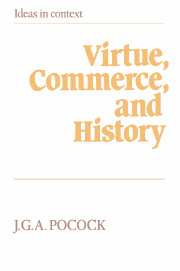 Virtue, Commerce, and History
Virtue, Commerce, and History 11 - The varieties of Whiggism from Exclusion to Reform: A history of ideology and discourse
Published online by Cambridge University Press: 05 May 2010
Summary
From the First Whigs to the True Whigs
“But she is a Whig,” an academic woman of high distinction once said to me of Caroline Robbins, whom this essay was first written to honor. The description may have been culturally rather than historiographically apt; a case can be made for regarding Professor Robbins not indeed as a gravedigger, but certainly as a deconstructor of the Whig monolith – if, that is, it should not be thought “Whiggish” to maintain that there ever was one. Her major work, The Eighteenth-Century Commonwealthman, appeared in 1959, and its function was to reveal to us the existence of a persistent tradition of Whig dissent, in which a succession of Old Whigs, True Whigs, and Honest Whigs – collectively known to us as “Commonwealthmen” – kept up a criticism of the principles and practices of the regime known to us as “the Whig supremacy,” originating before its foundations in the Revolution of 1688 and audible well after the revolutions of 1776 and 1789. There was in fact a profound schism in Whig political culture, and we have been working out its implications ever since. Let us review the historiographical chronology.
Almost thirty years earlier, Herbert Butterfield had taught us to view with suspicion what he called “the Whig interpretation of history,” and by 1959 we had begun studying its origin as itself a historical phenomenon.
- Type
- Chapter
- Information
- Virtue, Commerce, and HistoryEssays on Political Thought and History, Chiefly in the Eighteenth Century, pp. 215 - 310Publisher: Cambridge University PressPrint publication year: 1985
- 18
- Cited by
